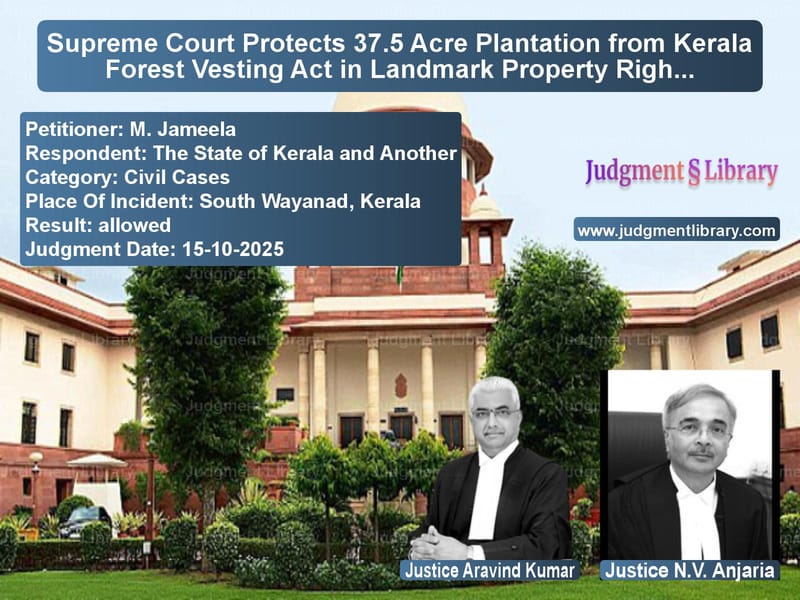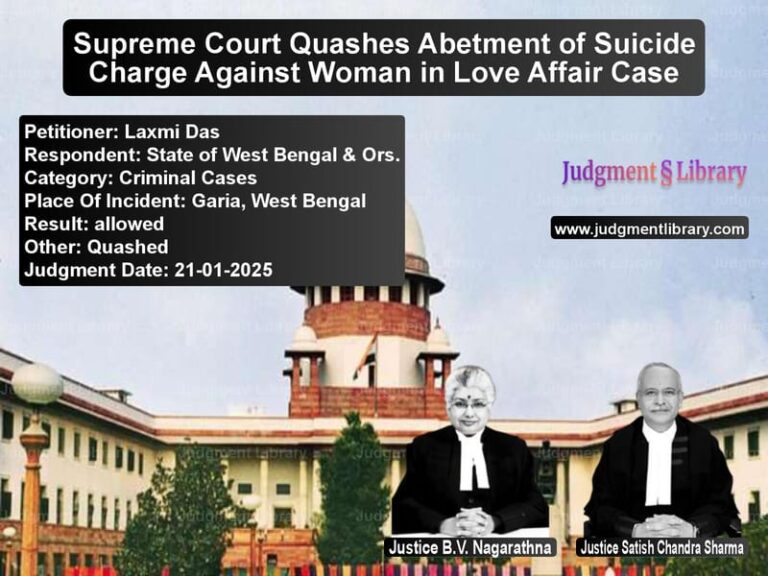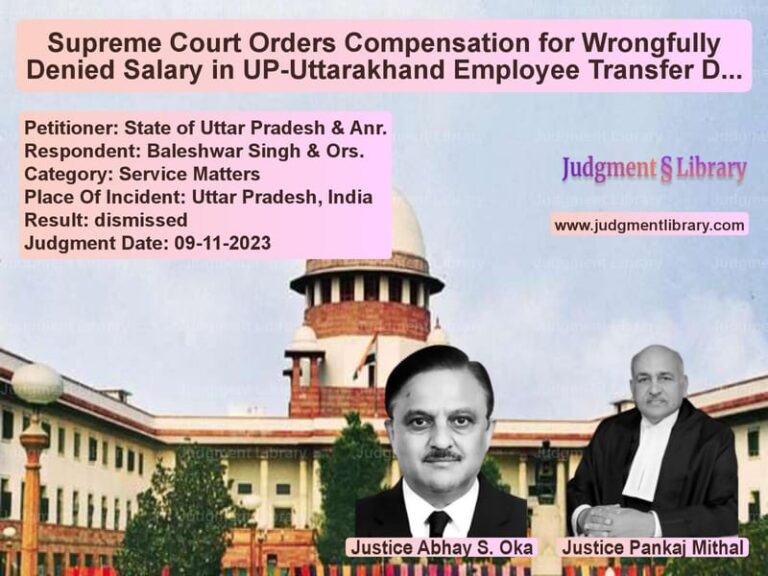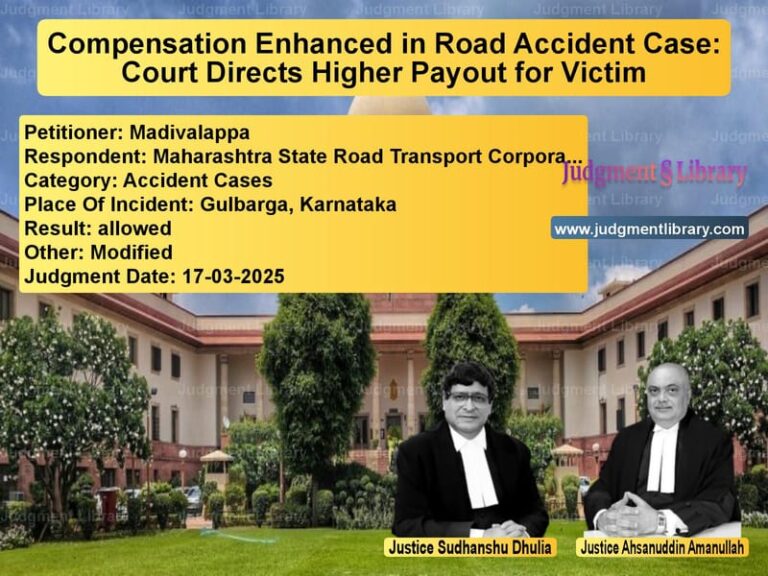Supreme Court Protects 37.5 Acre Plantation from Kerala Forest Vesting Act in Landmark Property Rights Case
In a landmark judgment that balances environmental conservation with property rights, the Supreme Court has delivered a decisive victory to a Kerala plantation owner in a legal battle spanning nearly three decades. The case involved M. Jameela’s 37.5-acre coffee and cardamom plantation in South Wayanad, which the Kerala government had sought to claim as ‘vested forest’ under the Kerala Private Forests (Vesting and Assignment) Act, 1971. The dispute centered around whether the land qualified as private forest that should be taken over by the state or whether it was a bona fide agricultural plantation exempt from vesting.
The legal journey began in 1997 when the Forest Department suddenly claimed that portions of Jameela’s plantation were actually vested forest, despite the property having been cultivated since the 1950s and recognized as agricultural land by various government departments for decades. What followed was a protracted legal battle that went through the Forest Tribunal, the Kerala High Court, and finally to the Supreme Court, with the fate of the 37.5-acre plantation hanging in the balance.
The Historical Background
The property’s history dates back to 1956-57 when the original owner, Parappu Mappilakath Imbichi Ahmed, purchased 37.50 acres from the Kalpetta Estate. Crucially, he obtained all necessary permissions under the then-operative Madras Preservation of Private Forests Act, including clearance to deforest the land for agricultural purposes. The entire area was cleared and planted with coffee and cardamom by 1957, transforming what was once forest land into a productive agricultural plantation.
The appellants’ counsel, Senior Advocate Sri Chidambaresh, presented a compelling historical narrative supported by extensive documentation. He emphasized that ‘the evidence overwhelmingly demonstrates the existence of a bona fide plantation on the land well before 10.05.1971, which takes the land out of the purview of vesting.’ The property had been continuously cultivated for decades, with official registration certificates for both coffee and cardamom plantations issued in 1971-72, shortly after the Vesting Act came into force.
The Legal Arguments
The appellants’ legal team built their case around several key pieces of evidence. They presented the Coffee Board Registration Certificate from 1972 and Cardamom Registration Certificate from June 1971 as conclusive proof that the plantations existed prior to the Vesting Act’s cutoff date. As Senior Counsel Chidambaresh argued, ‘These official certificates, issued shortly after the appointed date, are said to be conclusive proof that the respective crops (coffee and cardamom) were planted and in existence at least by 1971.’
Perhaps even more compelling was the evidence that various government departments had consistently treated the land as agricultural property. The Taluk Land Board in 1976 had explicitly recognized the property as exempt plantation land under the Kerala Land Reforms Act. The owners had been paying plantation tax and agricultural income tax for decades, and significantly, the Forest Department’s own initial demarcation in the 1970s had excluded the plantation from vested forest boundaries.
Senior Counsel Chidambaresh made a powerful argument about the Forest Department’s inconsistent stance: ‘When the private forests in the region were surveyed and vested in the 1970s, the Department’s surveyors did not include this land in the vesting notification. On the contrary, as evidenced by the letter and sketch from the forest demarcation file, the Department’s officials physically demarcated the boundaries so as to exclude the 12.50-acre coffee plantation from the adjoining reserve forests.’
The appellants also presented expert evidence from a retired Deputy Director of the Coffee Board, who inspected the plantation in 2007 and estimated that many coffee plants were 40-42 years old, meaning they were planted in the mid-1960s, well before the 1971 cutoff date.
The State’s Counter-Arguments
The State of Kerala, represented by Senior Advocate Sri Jayanth Muth Raj, argued for a strict interpretation of the Vesting Act. He emphasized that ‘the exemption clauses (Sections 3(2) & 3(3)) have to be construed strictly, and the burden lies on the person claiming exemption to clearly establish their case.’
The State questioned whether the entire 37.50 acres was fully planted by 1971, suggesting that some portions might have remained undeveloped. Their counsel argued that ‘the heavy reliance on later documents (1972 coffee certificate, 1976 Land Board order, etc.) is, in the State’s view, misplaced because those do not incontrovertibly speak to the ground reality as on 10.05.1971.’
Regarding the expert evidence, the State took a skeptical view, contending that ‘the so-called expert did not follow any rigorous scientific procedure such as dendrochronology (ring analysis) or carbon dating to fix the age of the plants. Instead, he employed a rough-and-ready method of visual inspection, which can be subjective.’
The Supreme Court’s Analysis
The Supreme Court conducted a thorough examination of the evidence and legal principles. The Court found that the lower courts had taken an unduly dismissive approach to the compelling evidence presented by the appellants.
Regarding the existence of plantations before 1971, the Court made a significant observation: ‘The historical narrative, supported by various documents, reveals that as early as 1956–57 the entire 37.50-acre plot was deforested and planted with coffee and cardamom by the then owner Shri Imbichi Ahmed.’
The Court gave substantial weight to the plantation registration certificates, noting that ‘A Coffee Board registration in 1972 implies the planter had an established coffee cultivation that needed to be brought within the Board’s regulatory purview.’ Similarly, the cardamom registration from June 1971, just weeks after the Vesting Act came into force, ‘strongly suggests that by May, 1971 the cardamom crop was existent (likely planted a few years prior, as cardamom typically takes 2-3 years to mature).’
The Court was particularly critical of the Forest Department’s belated claim in 1997, after having excluded the property from vested forests in their original demarcation. The judges noted that ‘if indeed those 2 acres were untouched forest amidst the coffee, it is improbable that the original survey team would have missed that fact. No convincing reason or evidence was given by the State as to what changed or what new information came to light in 1997 prompting the claim on exactly 2 acres.’
On the expert evidence, the Supreme Court disagreed with the High Court’s characterization of it as ‘not scientifically substantiated.’ The Court stated: ‘We respectfully disagree with that characterization. Within the limitations, the expert did scientifically substantiate it by reference to observable physical indicators on the plants. It was not a mere guess.’
The Court made an important observation about the standard of proof in such cases: ‘The Tribunal and High Court, in our view, fell into error by effectively placing a higher standard (almost requiring scientific certainty) on the appellants. We reiterate that in vesting matters, once the claimant produces substantial evidence of cultivation, slight gaps or doubts should not negate the claim, especially if the claimant’s version is inherently probable and the State has largely left it uncountered.’
The Final Ruling
In its conclusive findings, the Supreme Court declared: ‘We hold that the appellants (and their predecessor-in-title) have established their case that the lands in question are not private forests vested in the Government but are exempted lands under Sections 3(2) and 3(3) of Act 26 of 1971.’
The Court allowed the appeals and set aside the judgments of both the Forest Tribunal and the High Court. In a comprehensive relief package, the Court declared that the appellants are the lawful owners of the entire 37.50 acres and that the property never vested in the government. The Court restrained state authorities from interfering with the appellants’ possession and enjoyment of the plantation lands and directed that any incorrect boundary markings be corrected within six weeks.
In a significant closing remark, the Court expressed hope ‘that the State will henceforth show greater circumspection and fairness in scrutinizing claims of this nature, to avoid unnecessary litigation against citizens who have prima facie valid exemptions.’
This judgment represents an important precedent for property rights in Kerala, particularly for plantation owners who have historically converted forest lands to agricultural use. It reinforces the principle that genuine agricultural operations should be protected from belated government claims, especially when supported by decades of official recognition and documentation. The decision also serves as a reminder that conservation laws must be balanced with fairness to those who have invested in legitimate agricultural enterprises over generations.
Petitioner Name: M. Jameela.Respondent Name: The State of Kerala and Another.Judgment By: Justice Aravind Kumar, Justice N.V. Anjaria.Place Of Incident: South Wayanad, Kerala.Judgment Date: 15-10-2025.Result: allowed.
Don’t miss out on the full details! Download the complete judgment in PDF format below and gain valuable insights instantly!
Download Judgment: m.-jameela-vs-the-state-of-kerala-supreme-court-of-india-judgment-dated-15-10-2025.pdf
Directly Download Judgment: Directly download this Judgment
See all petitions in Property Disputes
See all petitions in Environmental Cases
See all petitions in Landlord-Tenant Disputes
See all petitions in Damages and Compensation
See all petitions in Specific Performance
See all petitions in Judgment by Aravind Kumar
See all petitions in Judgment by N.V. Anjaria
See all petitions in allowed
See all petitions in supreme court of India judgments October 2025
See all petitions in 2025 judgments
See all posts in Civil Cases Category
See all allowed petitions in Civil Cases Category
See all Dismissed petitions in Civil Cases Category
See all partially allowed petitions in Civil Cases Category







